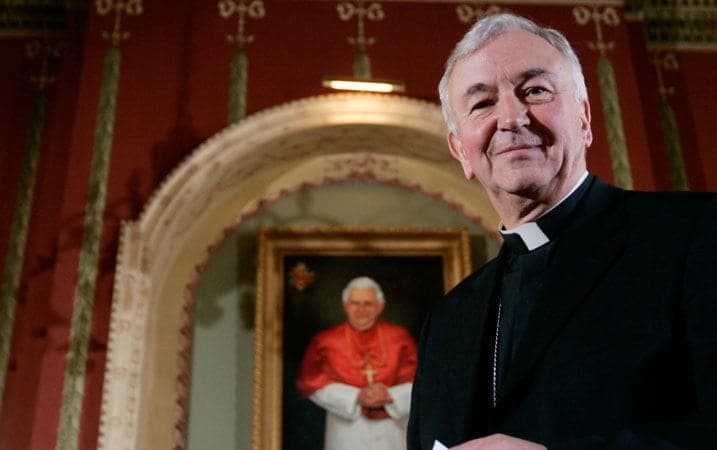ROME — Two British prelates taking part in the 2015 Synod of Bishops say they want the summit to help bridge the perceived gap between family realities and Church teaching, but without any compromise on the substance of that teaching.
“God’s mercy isn’t a putting aside of the demands of the Gospel,” said Cardinal Vincent Nichols of Westminster in the United Kingdom.
Bishop Peter Doyle of Northampton, the only other British prelate participating in the synod, said that if the synod’s conclusion isn’t about “promoting and presenting what we believe Jesus is about, then we might as well just go home.”
The bishops sat down with Crux Saturday at the Venerable English College, the seminary in Rome for clergy from England and Wales.
“The fundamental challenge of this synod is one laid down by Jesus himself,” Nichols said. “On one hand, Jesus told us, ‘Divorce is not for you, marriage is for life, what God has put together, man cannot divide’.”
Yet, Nichols added, Jesus also says: “Come to me all of you who labor under an awful burden, and I will offer you rest.”
Ever since then, Nichols said, “The Church has tried to hold those two together, and we have to continue to do the same.”
Asked about the possibility of the Church changing teaching on issues such as divorce, Doyle said that “instead of saying ‘the Church has to change or not,’ what all of us have to do is to change and be converted to Jesus.”
Based on 37 years of experience as a parish priest, Doyle said he’s been faced with the challenge of working with couples who are in a second union, “trying to see how their relationship with each other, Jesus, and the Church can develop.”
Such couples – who, if they’re divorced and remarried civilly, are seen by the Church as in an adulterous relationship – can nevertheless be witnesses to the faith, Doyle said.
“In a Sunday Mass, it’s not for me to judge, but often that couple who are in a second marriage, you can’t help thinking that they are perhaps closer to God than those of us who can go to Communion.”
“But I don’t think we can rip up our teaching about indissolubility, because if you do that, everything falls apart,” Doyle said.
For Nichols, much of the debate on this issue comes from the fact that there’s a misinterpretation of the sacraments as the only path to grace, and of Communion as a “badge of approval, that is given or withheld,” when in reality it’s a “path to conversion.”
Nichols quoted St. Thomas of Aquinas to make his point: “God is not limited by his sacraments.”
“The working of God in our lives, the grace of God in our lives, is not limited to the sacramental economy,” Nichols continued. “It’s like saying, ‘Unless I receive Holy Communion, I don’t have access to grace.’ That is not true.”
In his experience, when he receives the Eucharist, he’s asked to be different.
“We can only fully receive the Lord in Holy Communion if we’re ready to change, if we recognize where change is needed in our lives,” he said. “Unless my desire is to be with Christ, then my reception of the Eucharist is skimpy, superficial.”
When asked about the debate over whether Catholics who divorce and remarry without an annulment should be able to receive Communion, Nichols said it isn’t a “yes or no question, and there certainly won’t be a yes or no answer.”
He believes that when all is said and done, there will be no one-size-fits-all response, because every story is different and every circumstance is different, which is why he said the response of the Church has to be personal.
Nichols came away from last year’s synod saying he could support Communion for remarried divorcees after what he called a “demanding penitential pathway.”
Both Nichols and Doyle ruled out the concept of a “Catholic divorce,” but underlined the importance of the annulment process because, they insisted, in many cases in which a relationship has broken down, there was no sacramental bond.
As for other challenges families face that they’d like to see the synod bishops discuss, both prelates mentioned immigration.
“We’re conscious in England of families who have relatives in the Middle East, in refugee camps,” Doyle said. “We would very much like to have the people in the refugee camps reunited with their families, but the government has roped together very strict regulations on who can come into the country.”
Nichols agreed: “It’s a disgrace that the British government separates married couples because of their nationalities.”
When it comes to the outcome of the synod, both bishops said that they would like to see Francis write a document called “The Joy of the Family,” a reference to his previous apostolic exhortation, the “The Joy of the Gospel.”
It could be an exhortation, Nichols said, “to set us off in a real, deeply prayerful appreciation of the grace at work in so many families. The family is the basic human experience, where we learn to be human, about our faith, what life is about.”
“There’s nothing more important than the family,” he said.















